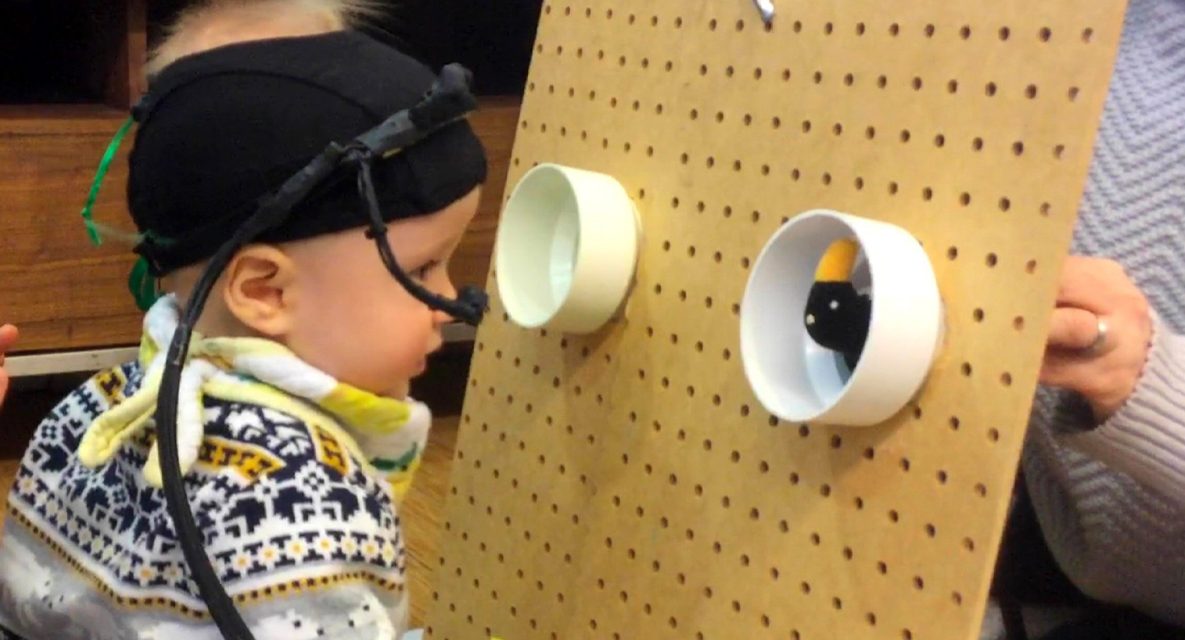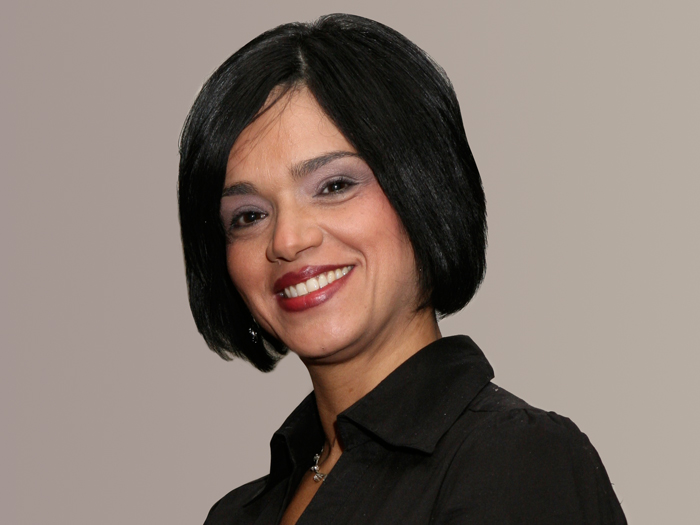Department of Psychology Professor Sarah Berger and members of her doctoral student cohort are breaking significant ground in the study of how sleep affects cognitive behavior in infants, part of a $630K National Science Foundation (NSF) grant called The Role of Sleep in Infant Motor Problem Solving, a joint venture with Dr. Regina Harbourne of Duquesne University, Department of Physical Therapy.
Dr. Berger and her students, working in the Child Development Lab in Building 4S, are primarily focused on how sleep is related to infant learning, and how the quality of sleep prepares infants to learn. A cohort of over 80 infants have participated in the vast study. Students seeking their Doctorate in Developmental Psychology are analyzing how the cohort of infants engage in problem solving after periods of observed rest.

The students are doing a great deal of research using a head-mounted eye-tracker that records an infant’s eye movements in real-time as they search for, reach, grasp, and explore toys, before and after periods of sleep. Researchers will ask whether infants’ ability to solve a kind of hide-and-seek problem with toys improves between training & testing, as half of the babies are tested after a nap and the other half after staying awake. Sleep is measured at infants’ homes, in their own cribs, using a Nanit home video baby-monitor system. Nanit’s computer vision algorithms report infants’ sleep quality and Dr. Berger and her students code infants’ behavior from video of their “play-time” at the research center, helping to get an assessment of how sleep is affecting an infant’s capacity to learn and develop. In previous work with older infants, Dr. Berger and her researchers found that infants who napped learned the task better than those who did not, even when tested the next day after a night’s sleep. The current research asks whether this same pattern is true for younger infants (6-8 mos).
“This research is important because it helps researchers, caregivers and policymakers understand the relation between sleep and learning,” said Dr. Berger. “Once we establish the importance of sleep for infants’ health and development, then we can make informed decisions about establishing sleep routines; best practices in early intervention, such as when therapy would be most effective; and planning infants’ daily schedules at home or daycare. This study in particular allows us greater access to infants’ behavior in the crib than ever before so we can observe infants at home, without disrupting their daily routines.”
The impetus for the study, according to Dr. Berger, centers on the ongoing learning that occurs over infants’ first year of life, and trying to understand the circumstances around learning that foster success, including sleep and proper rest. She admits to being fascinated by a baby’s desire to do “the hard work” necessary in learning, something illustrated to her during research she conducted with students using a “play tunnel.”
“We put babies who have learned to walk in front of a tunnel with their parents on the other side, and the infants have to figure out how to fit and maneuver their bodies to fit in the tight space,” she noted. “You would think the babies would just crawl to get to the other side, but once they’ve learned to walk they are reluctant to. It’s fascinating to see them wanting to focus on the harder problem and to figure out walking.”
Families from the community are invited to participate in the study and work with Dr. Berger’s team of researchers in the lab. Dr. Berger’s study includes babies born both prematurely and at full term, and she hopes that the analysis and research can inform best practices in early intervention and in advising caregivers about the importance of sleep for healthy development. “Including premature infants in this study will help us to develop a model of the principles of sleep as it relates to learning,” Dr. Berger said.
“We have a pretty good sense of how sleep impacts learning in older infants and young children, but infants’ sleep changes so much over the first year that we don’t know whether we can generalize previous work to this population,” she added. “We will consider this work a success if we are able to expand our knowledge of the relation between sleep and learning to a broader population. Whether we discover that sleep impacts learning and problem solving in the same way across the first year or that there are changes in that relationship will be transformative to a theory of the relation between individual differences in sleep and learning.”
The cutting-edge research is not only beneficial to the scientific and pediatric community but to the students currently working in the lab alongside Dr. Berger. The NSF grant is assisting those students and has helped offset some of the costs associated with the cutting-edge technology needed for the study. The funding also supports the students with stipends so they can have the time to carry out the research required for their degree. CSI undergraduates also work in the center, gaining research experience while working on their honors thesis in high-level Psychology courses. Some students, like Michele Goncalves Maia, a Pediatric Physical Therapist in Brazil and now a doctoral student at The Graduate Center, says the work in the lab is invaluable.
“This project has been an amazing opportunity because I’ve been able to work in an interdisciplinary way with Psychology and Physical Therapy, learning how those areas are complementary and make the understanding of motor and cognitive development in infants way richer and more robust,” she said. “With this research project, I’ve been able to work on recruitment, collecting data from families in the US and Brazil, organizing, managing, analyzing, and presenting the data in research conferences. This project is relevant to my professional career for broadening my research experience and strengthening my critical thinking, writing, communication, organization, and time management skills.”

Lizbet Rodriguez, a Macaulay Honors College junior majoring in Psychology with a double minor in Speech-Language Pathology and Linguistics, first learned about the study through the Luis Strokes Alliance for Minority Participation (LSAMP) program, and received one of the NSF-funded summer research internships offered by the lab last year, remaining with Dr. Berger as a Lab Manager since.
“This study interested me because it’s something that hasn’t been done before. Studying babies as young as the ones we’re working with is very rare and we are getting so many interesting findings out of it,” said Rodriguez. “We get to zoom into specific developmental periods in young infants and research the impact of sleep on their motor and cognitive development. The hands-on experience I have gotten through the lab has been incredible and I am truly blessed to have joined at a time where we get to collect raw data and work with actual participants. I joined the lab when this project was in its beginning stages and we’ve learned so much, becoming experts at all the new technology and the experimental procedures. The experience I’ve gotten with video coding and using eye-tracking technology has been so valuable in developing my research skills. Additionally, having a research background in child development, specifically motor development, has provided me with important knowledge that I plan to apply to my future career in Speech-Language pathology.”
The NSF grant awarded to Dr. Berger and the team at Duquesne is a four-year grant that will enter its final year in the fall of 2023. Recently she received two supplemental grants for continued collaborative research that will extend the grant cycle. One supplement is a collaboration with a doctoral student in computer science who serves as a liaison between Dr. Berger’s team and Nanit to help automate the coding processes through video recognition, opening another door for collaborative work centered on the relationship of sleep with the learning of new motor skills in babies. The second supplement will fund a special industry internship for Michele Goncalves Maia. The NSF recognizes that the research skills that students gain in doctoral programs has value both in and outside of academia, but that most students don’t learn about non-academic research opportunities. Michele will work closely with Dr. Natalie Barnett at Nanit to learn about how research is used in business for product development and Michele will provide her expertise to the company.
For more information on The Role of Sleep in Infant Motor Problem Solving project, visit https://csichildlab.wixsite.com/csichildlab.




![[video] Rap Video Wins “Best Song” in the 2014 Society for Neuroscience Brain Awareness Video contest](https://csitoday.com/wp-content/uploads/2014/09/Neuroscienceminds.jpg)











